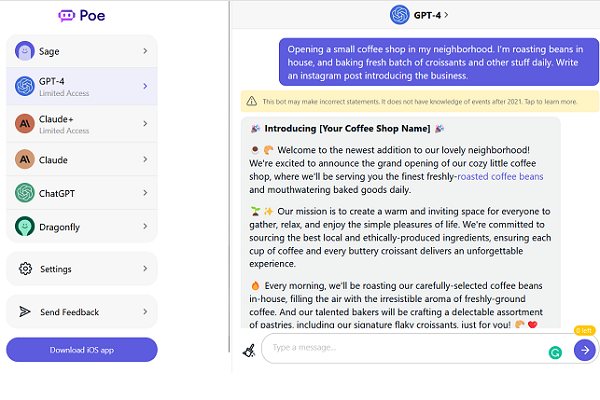Quora Unveils Subscriptions for Generative AI Chatbot Hub Poe
 Quora has released a new premium subscription service for its generative AI chatbot app Poe. The iOS app and web platform offer a central clearinghouse for multiple generative AI-powered chatbots, including OpenAI’s new GPT-4 model and both versions of Anthropic’s newly released Claude AI chatbot.
Quora has released a new premium subscription service for its generative AI chatbot app Poe. The iOS app and web platform offer a central clearinghouse for multiple generative AI-powered chatbots, including OpenAI’s new GPT-4 model and both versions of Anthropic’s newly released Claude AI chatbot.
Paying for Poe
Poe, which stands for the Platform for Open Exploration, provides access to multiple generative AI chatbots, though the free tier is very limited in accessing the newest generative AI chatbots. Those not subscribed can send and receive once a day with the GPT-4 and Claude+ models. Quora created Poe as an experiment in helping users find out information, compose text, and resolve problems or riddles, but Quora doesn’t do any moderation beyond what is built into the models. The databases built into the AI models provided are supplemented by additional knowledge provided by Quora users.
The subscription service sign-up is only available through the mobile app and costs $20 a month, with a discounted yearly fee of $200. The subscription fee allows far more communication than the free variant but still caps monthly interactions to 300 for GPT-4 and 1,000 for Anthropic’s Claude AI chatbot. Crossing that limit is allowed but could mean a lower-quality response from the AI. The other models still have unlimited free access without payment and include Sage, Dragonfly, ChatGPT, and an earlier iteration of Claude.
“Because we are moving fast and we wanted to make [GPT-4 and Claude+] available to as many people as possible as quickly as possible, we are unfortunately only able to offer subscriptions to iOS and Apple Silicon (M1/M2 chip) Mac users of Poe immediately,” Quora CEO Adam D’Angelo wrote in a blog post. “When other developers add bots to Poe in the near future, they will be free and accessible to everyone by default, but developers may choose to limit access from non-subscribers as part of a revenue share.”
Follow @voicebotaiFollow @erichschwartz
OpenAI Debuts GPT-4 Multi-Modal Generative AI Model With a Sense of Humor








